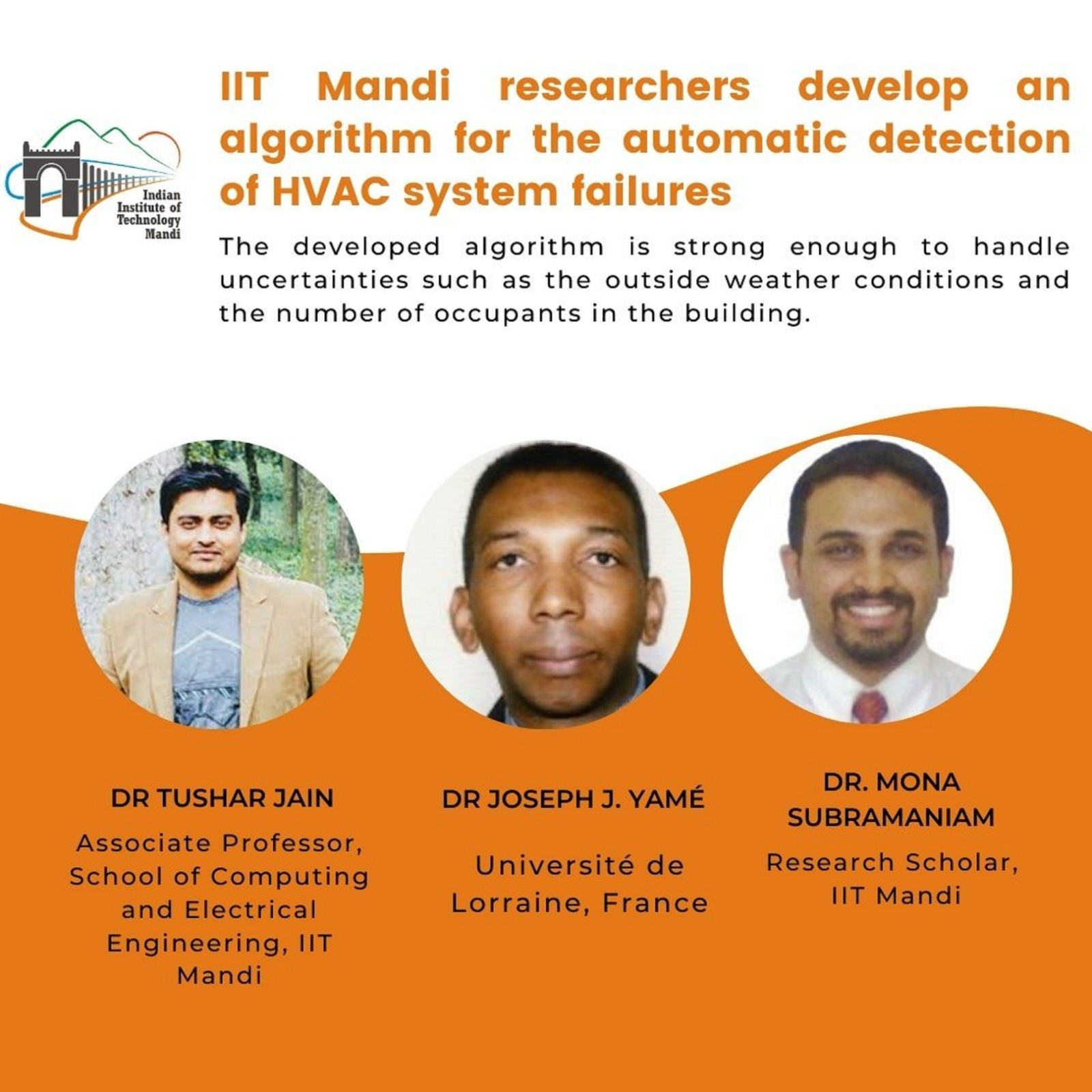
The developed algorithm is powerful enough to handle uncertainties such as the outside weather conditions and the number of occupants in the building.
Video Link – https://drive.google.com/file/d/1w_GrILadwhZ7i28nYytbzjkl8wEbm1ZT/view
MANDI, 24th April 2023: A team of researchers from Indian Institute of Technology Mandi have collaborated with a scientist from Université de Lorraine, France, to develop a novel algorithm that automatically detects operational failures in Heating Ventilation and Air-Conditioning (HVAC) systems installed in buildings.
The results of this research have been published in the Journal of Building Performance Simulation in a paper coauthored by Dr Tushar Jain, Associate Professor, School of Computing and Electrical Engineering and his research scholar Dr Mona Subramaniam from IIT Mandi and his collaborator Dr Joseph J. Yamé from Université de Lorraine, France
Heating Ventilation and Air-Conditioning (HVAC) systems are essential for maintaining the thermal comfort of occupants inside buildings. HVAC systems employing Variable Air Volume (VAV) terminal boxes offer an energy-efficient solution to maintain the thermal comfort of occupants inside the building. A VAV box sends a controlled amount of processed air inside each zone of the building.
The sensors and dampers in VAV boxes can become faulty and need repairs. However, detecting and identifying these faults manually is a slow, costly, and error-prone process. Delays in detecting and fixing the faults in HVAC systems can lead to indoor environmental issues, such as poor thermal comfort and indoor air quality, affecting occupant health and productivity. This also results in the wastage of energy, thereby reducing building energy efficiency. Research suggests that faults in HVAC systems could increase the energy consumption of buildings by 4% to 18%.
To address this problem, IIT Mandi researchers have developed an automated fault detection and diagnosis (FDD) algorithm that integrates with the building automation system (BAS) or building energy management system (BEMS). This system helps maintenance crews identify and predict potential failures, analyze their impact, determine their importance to the BAS, and quickly direct repairs, ensuring that the system is always available.
Describing the technical details of the development, Dr Tushar Jain, IIT Mandi said, “Our algorithm is robust against unmeasured disturbances and sensor noise, particularly the outdoor temperature, which affects the thermal dynamics of the building.”
The researchers used the SIMBAD software, based on MATLAB, to simulate a one-storey building with three zones and show how well the developed algorithms work. They tested four different single and multiple VAV damper fault cases in two different scenarios.
IIT Mandi’s algorithm can be retrofitted with existing BAS/BEMS without additional hardware installation. The algorithm is strong enough to handle uncertainties such as the outside weather conditions and the number of occupants in the building. This means that building engineers do not have to simplify the thermal dynamics model or use basic rule-based control or monitor algorithms that don’t work well. The algorithm also estimates wall temperatures, which is important in predicting faults.
When added to the HVAC automation system, this algorithm developed by the IIT Mandi researchers can enhance the energy efficiency of buildings and enhance the comfort of occupants. It is a cost-effective approach that can help building operators save time and money by detecting and automatically addressing HVAC issues, reducing downtime, and lowering energy costs.
This algorithm is a testament to the innovative capabilities of IIT Mandi researchers and their commitment to advancing the building automation industry through cutting-edge technology.
About IIT Mandi
IIT Mandi has nine Academic Schools and five major Research Centers. The Schools are the School of Biosciences and Bioengineering (SBBE), School of Chemical Sciences (SCS), School of Mathematical and Statistical Sciences (SMSS), School of Physical Sciences (SPS), School of Mechanical and Materials Engineering (SMME), School of Civil and Environmental Engineering (SCENE), School of Computing and Electrical Engineering (SCEE), School of Humanities and Social Sciences (SHSS), and School of Management (SOM). The Centers are Advanced Materials Research Centre (AMRC), Centre for Design and Fabrication of Electrical Devices (C4DFED), BioX Centre, Indian Knowledge System and Mental Health Applications Centre (IKSMHA Centre) and Centre for Artificial Intelligence and Robotics.
The Institute offers B.Tech. programs in seven different streams, one M.A. program, ten M.Tech. programs, nine Ph.D. programs, and one iPh.D. program. The unique, project-oriented B.Tech. curriculum is centered around its 4-year long Design and Innovation stream. Since the inception of the Institute, IIT Mandi faculty have been involved in over 275 Research and Development (R&D) projects worth more than Rs. 120 crores.
IIT Mandi established the IIT Mandi iHub and HCI Foundation (iHub; a section-8 company) on its campus at Kamand with significant funding of INR 110 crores from the Department of Science and Technology (DST), Government of India. The iHub is planned to fuel research and technology development, skill development, startup and innovation, and collaborations in the HCI and allied AI/ML areas in India. IIT Mandi is the only second-generation IIT to be featured at rank 7 in the Atal Ranking of Institutions on Innovation Achievements of the Innovation Cell, Ministry of Education, Govt. of India.
Twitter: @iit__mandi
Facebook: IIT Mandi
Website: https://www.iitmandi.ac.in
____________________________________________________________________________________
MEDIA CONTACT FOR IIT MANDI
IIT Mandi Media Cell: [email protected] / Landline: 01905267832
Bhavani Giddu – Footprint Global Communications
Cell: 9999500262 / Email: [email protected]
Kajal Yadav – Footprint Global Communications
Cell: 88059 66194 / Email ID: [email protected]
Puja Panda – Footprint Global Communications
Cell: 86280 39359 / Email ID: [email protected]






